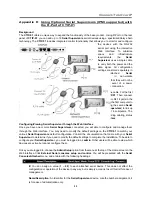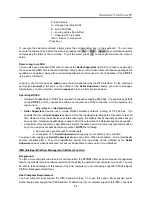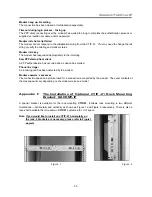
Connect-Tek Over IP
54
•
PPP (Point-to-Point Protocol) must be used; no other authentication methods are supported.
•
TCP/IP must be installed/enabled on the computer making the connection, and must be used for
the dial-up connection.
•
The connection must be configured to obtain a dynamic IP address.
•
The user name/password must match a user currently configured on the
CTIP-01
.
•
For best performance and to simplify the troubleshooting process, firewall software should not be
used with the dial-up connection.
Accessing the Web Interface
Once a dial-up connection has been established, you can access the Web interface or start a VNC session
using the following IP address:
https://99.99.99.99
You can now login to the Web interface (and/or VNC session) normally. Note that the remote machine (the
one you dialed from) is automatically assigned the IP address 99.99.99.100 for the PPP session. This, and
the IP address of the
CTIP-01
, cannot be modified. The following TCP/IP port numbers are assigned for a
PPP connection, regardless of the settings configured in the Web interface for the
LAN
or
WAN
ports:
HTTPS: 443
VNC (clear-text): 5900
VNC (SSL secured): 15900
SSH: 22
Performance Notes
All images over the PPP connection will be grayscale to conserve bandwidth. If other users are connected
while a PPP session is active, their screens will be in grayscale as well. When PPP is inactive, color is
automatically re-enabled.
Some areas of the screen may not be updated as frequently as others, and animations or other
auto-updating areas of the screen may appear out-of-focus or “blocky” as a result. Since the area around the
mouse pointer is refreshed most frequently, hold the pointer over an area to improve its clarity.
It may be beneficial to minimize any unnecessary icons, backgrounds, or other clutter on the host computer’s
desktop to make the dial-up connection as efficient as possible.
When the modem feature is enabled, you can use a “line modem” connection on the serial port using a serial
cable to begin a PPP session. If you are using the
DTE Serial
port on the front panel, use a null modem
serial cable. If you have disconnected the modem and are using the
DCE Serial
port on the rear panel for
the PPP connection, use a straight through serial cable. When the modem is not actively connected, you can
begin a PPP session at up to 460 kbps. To hang up and re-connect the modem, end the PPP session.
If you need to configure the device over a serial connection while the modem option is enabled, connect a
serial cable (see immediately above for instructions on what type of cable to use for the port you are
accessing on the
CTIP-01
) and begin a terminal session following the instructions under “Terminal
Configuration Using a Serial Cable” in this manual. Once connected, you will see the following message:
Expecting a modem, if human, type admin password (Or start PPP)
Type the password for user
admin
and press enter. The password will not appear on the screen. The
configuration menu will appear. Make the changes you wish or press
q
and
Enter
to exit and leave the
modem connection active.
Troubleshooting Guide
The following messages will appear in the system log on the
Status
screen in the Web interface and may
help to diagnose problems with the modem configuration.
Starting PPP (for auth) on port…
Modem is connecting and the PPP login process is starting.


































